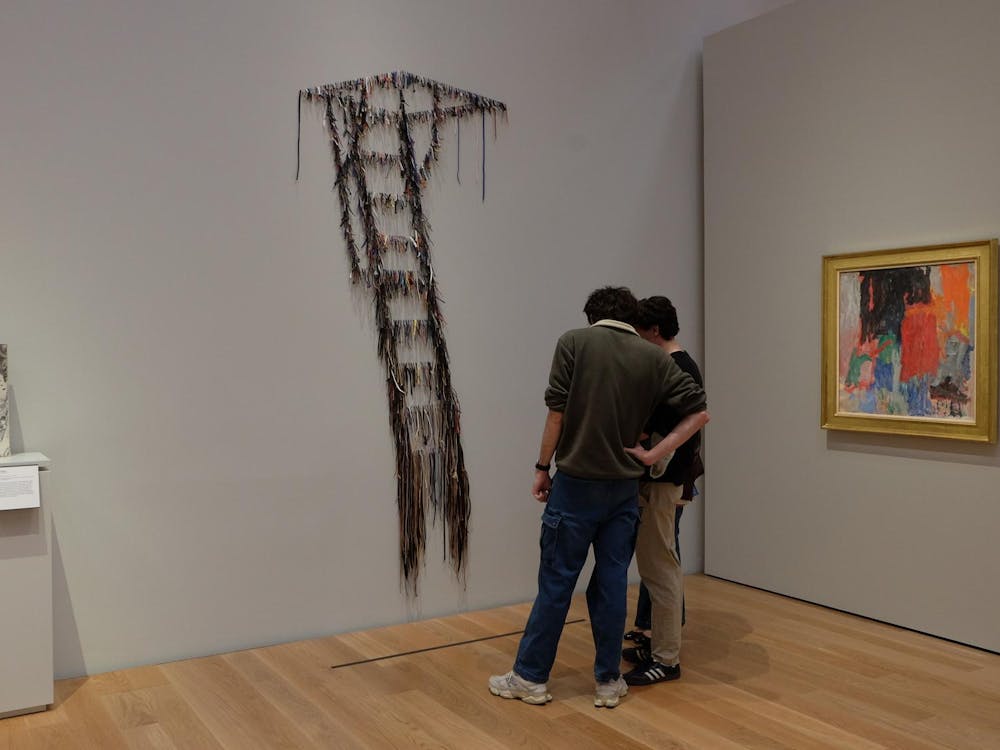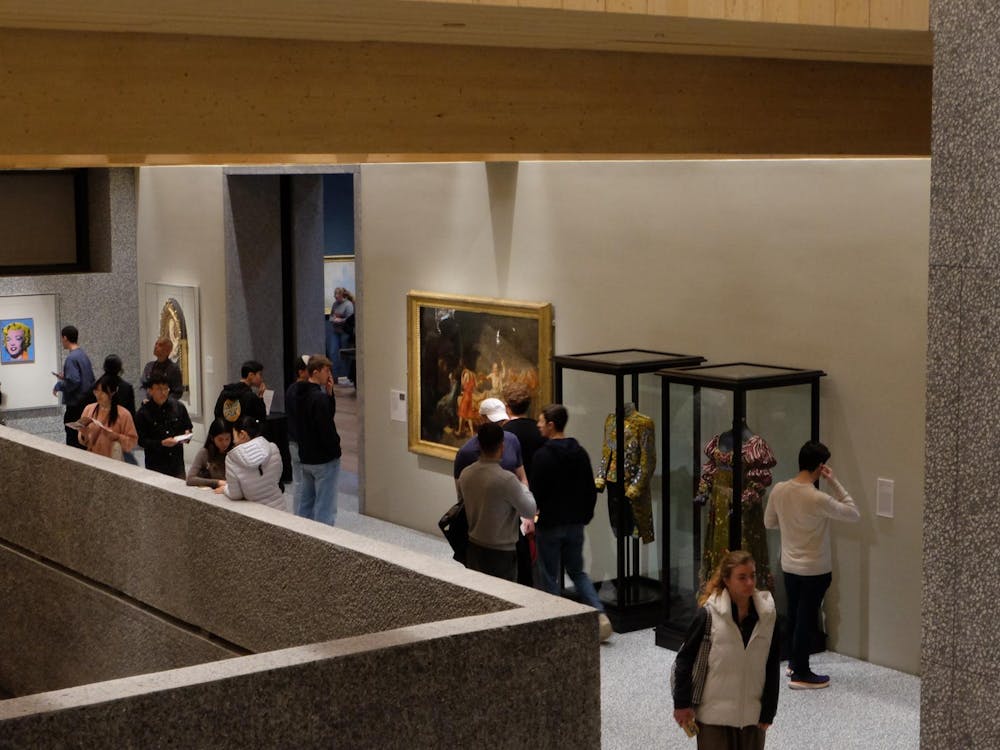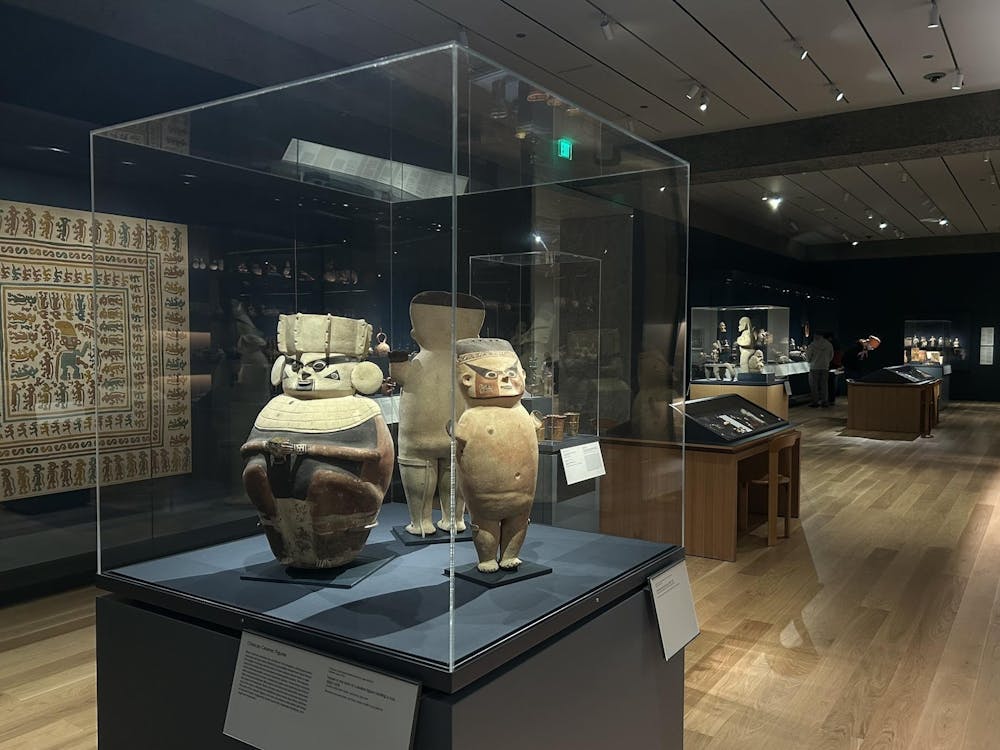Francisco Nava '09 admitted yesterday to fabricating an alleged assault on him that he said occurred Friday evening and to sending threatening emails to himself, other members of the Anscombe Society and prominent conservative politics professor Robert George. He admitted the falsification while being questioned by Princeton Township Police.
In an interview with The Daily Princetonian, Nava expressed remorse for his actions' effects on the recipients of the threatening emails, other Anscombe members and the general Princeton community. "I accept full responsibility for my actions and agree to face criminal and/or disciplinary proceedings from the University," Nava said. He declined to answer any other questions, however, including how he managed to inflict the injuries on himself and what motivated his actions.
Detective Sgt. Ernie Silagyi said Township Police became suspicious after "there were some things that didn't add up" in Nava's story. "We interviewed him this morning, we confronted him with the inconsistencies, and he admitted to fabricating the assault and the threatening emails," Silagyi said, adding that Nava told Township Police that his injuries were self-inflicted.
Nava was released to Public Safety, and charges "have not been filed pending further investigation," according to a statement from Township Police.
Nava may face charges of filing a false police report, which in New Jersey is the equivalent of a misdemeanor, Silagyi said. He added that, if convicted, Nava may face both jail time and community service. The latter penalty, however, is frequently "handled with a fine," Silagyi said.
"It's a decision that will be made in the future," Silagyi said.
University Communications Director Lauren Robinson-Brown '85 said the University is looking into the incident, and "the investigation is ongoing," adding that "as the investigation continues, we will continue to provide all necessary support to everyone involved."
"As standard procedure, discipline isn't considered until an investigation is concluded," Robinson-Brown said. The fabricated threats and assault are nonetheless likely to result in disciplinary proceedings against Nava.
The disclosure today that Nava, 23, of Bedford, Texas, had himself been responsible for the threats and the attack, which drew national media attention, frustrated several members of the close-knit conservative student campus community.
Those interviewed yesterday and today expressed puzzlement about what Nava
Former Anscombe president Sherif Girgis '08 said he is "deeply angry and upset" that the incident was fabricated. "I am deeply troubled about what this must mean about Francisco and about his personal life," he said, adding that he had harbored suspicions about Nava's story before the Township confirmed the assault was faked.
Girgis, who was one of the four Anscombe members who received threatening emails Wednesday evening along with George, added that he believed the organization — which promotes socially conservative sexual mores on campus — had handled the situation well. "We did everything right," he said. "We did not jump to any conclusion about the facts of the case."

Girgis said he had been uncertain about the veracity of the emailed threats even before Nava confessed to fabricating them, and he therefore requested that the USG not send any campus-wide emails about them and that the University refrain from organizing a large-scale event for members of the campus community to express solidarity with Nava and the threats' other recipients.
Additionally, George and Girgis worked with Ryan Anderson '04 — a writer for the blog "First Things" — to compose an article highlighting the irregularities in Nava's story. The blog, which is published by the Institute on Religion and Public Life, ran the story this morning.
Nevertheless, Anderson said in an interview with the 'Prince,' he still got the impression George and Girgis were leaning toward believing Nava at the time they composed the article. "At that point, the way they communicated with me was, 'We're 51 percent sure he's telling the truth,'" Anderson said.
In an interview with the 'Prince,' George said he finds it "hard not to feel some anger" about Nava's fabrication of the threats and assault. But, he added, "I do feel more pity than anger, and sorrow, because I think he's just wrecked his life." He added that he thinks the University will most likely expel Nava.
Chronology of the hoax
Nava had claimed that, at 5:45 p.m. Friday, two assailants accosted him when he was on his way to the home of a youth he tutors in the Township, pounded his head against a brick wall until he became unconscious, continued beating him with a glass bottle and told him in parting to "shut the fuck up," echoing the wording of the emailed threats he, George and the three other Anscombe members had received.
Around 7 p.m., George said, Nava called and said he had been attacked. "His speech seemed slurred, and he said he was calling from the emergency room at Princeton hospital," George said.
George said that when he visited Nava at the University Medical Center at Princeton (UMCP), Nava told him he was afraid to return to campus. "He didn't want to go back to his room; he said he was not comfortable in his room," George said. "I offered to let him come stay at our house and stay with me and my wife."
George added that Anscombe vice president Jonathan Hwang '09 — one of the four student recipients of the emailed threats, who was also visiting Nava at the hospital — offered to stay at George's house that night to awaken Nava every four hours, a protocol UMCP had advised in case Nava had suffered a concussion. George agreed.
But the next morning, Nava approached George and asked to talk to him in private about an incident from his past, which another threat recipient, Anscombe president Kevin Staley-Joyce '09, had discovered in the middle of the night and informed other Anscombe members about, and regarding which Hwang had then confronted Nava.
When he was a student at Groton School in Groton, Mass., Nava said, he had fabricated a threat against himself and his roommate, writing "Die Fags!" outside their door and reporting the message to school officials. "He told me he was friendless and very homesick and wanted out of Groton," George said. "In that condition he fabricated a threat against himself and was caught by Groton officials."
He added that Nava told him the University had made him defer his admission for a year after reading Groton's report of the incident to "get therapy and counseling" but still allowed him to matriculate at the University.
George said that, until Nava told him the Groton story, he had had "no reason to suspect Francisco's honor and integrity," citing the personal relationship they had developed after Nava took two of his courses, Nava's position as an alternate RCA in Butler College and his participation in the University's Religious Life Council. Afterwards, however, he became "very suspicious," George said, and he told Nava to inform the Public Safety officer investigating the assault of the earlier incident.
University and student response
The news that Nava fabricated the threats and assault comes after the University administration had received criticism from some students and campus groups for its low-key response to the threats and supposed attack, especially compared to its reaction to threats made on whiteboards in Whitman College against members of the LGBT community earlier this semester.
Nava had reported receiving threats before Wednesday evening's emails to the Anscombe officers and George, including a note slipped under his door one day when he returned from church, after he became more active in Anscombe this year and more open about his socially conservative views. It has not yet been confirmed that he also fabricated those earlier threats.
Anscombe public relations chair Brandon McGinley '10, whose opinion article in Friday's 'Prince,' titled "Open Season," criticized the University administration's lack of response to the threats against Nava, said the column had been his idea. "I volunteered my podium, my platform to tell his story," he said adding that "we're going to have to forgive him" for the fabrication.
Joel Alicea '10, who was formerly public relations chair for Anscombe and considers himself a "friendly acquaintance" of Nava's, called the news that the threats and attack were falsified "absolutely a bombshell. It was shocking."
Alicea expressed pity, however, for the repercussions Nava will likely face for his actions. "He's so smart and so talented and he'd have had such an amazing future if this hadn't happened," Alicea said. "That's the real tragedy."
Other students, however, were less sympathetic. "It's a pretty pathetic attempt to get attention," Jillian Alfred '10 said of Nava's actions.
Jon Bradshaw '10, though, said he was relieved by the revelation that no University students had actually been trying to stifle Anscombe members' views through emailed threats and the subsequent alleged attack on Nava. "I'm glad that these threats weren't real and students weren't threatening students for their beliefs," he said.
George expressed no concerns that Anscombe or other conservative students on campus will experience any negative fallout from Nava's actions. "The administration, Public Safety, the students who were threatened [and] the other members of Anscombe have all acted in an exemplary manner," he said. "They have worked together and cooperated together. Within 72 hours, we were able to expose this as a hoax."
National implications
Nava's confession comes amid several instances of falsified hate crimes on college campuses nationwide over the past several years, including one at the nearby College of New Jersey in 2001, when a gay student faked death threats to himself and other members of a pro-gay-rights student group.
More recently, a freshman at George Washington University confessed last month to drawing swastikas on the door of her own dorm room. Additionally, in 2004, a visiting psychology professor at Claremont-McKenna College faked a hate crime by vandalizing her own car and spray-painting it with racist and sexist epithets, for which she was sentenced to a year in prison.
The past few days' events at Princeton have already garnered similar national attention, with the 'Prince' receiving numerous inquiries today from national media outlets, including CNN, Fox News and The New York Times. Additionally, the story has been linked to by the Drudge Report and bloggers including Andrew Sullivan.
George, however, said he thinks the incident will reflect well on Princeton. Comparing this incident to last year's scandal at Duke University, in which several Duke lacrosse players allegedly assaulted an exotic dancer but were later found innocent, George praised University administrators' and students' ability to suspend their judgment and investigate what had happened before publicly commenting.
"Princeton, all the way from the administrators down, had the good sense to hold their fire, get the facts first, before drawing conclusions," he said. "There's a good example for other institutions. Follow the example of Princeton, not Duke."
— Princetonian staff writer Josephine Wolff and senior writer Michael Juel-Larsen contributed reporting to this article.







